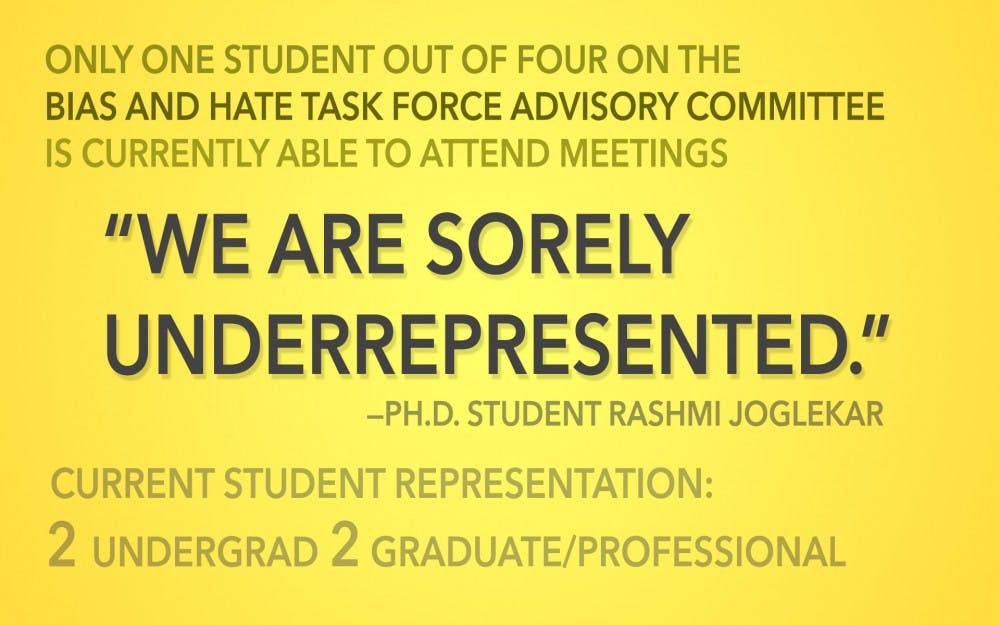The Bias and Hate Task Force advisory committee is struggling to maintain student involvement.
In late 2016, the University created a steering committee and an advisory committee to work on bias and hate issues after the original Bias and Hate Task Force released its recommendations in May. The advisory committee is chaired by Professor of Public Policy Kathryn Whetten and Paul James, assistant vice president of diversity, equity and inclusion, and is supposed to be composed of faculty, students, administrators and staff.
Larry Moneta, vice president for student affairs and a member of the steering committee, said that Duke typically strives to be as inclusive as possible when forming advisory groups.
“We have a rule of thumb—if you are a student group that cares about the topic, you have a seat at the table,” Moneta said. “The [Bias and Hate Task Force advisory committee] is going to do the same thing.”
However, Rashmi Joglekar, the incoming president of the Graduate and Professional Student Council and a Ph.D student in the integrated toxicology and environmental health program, noted that she is currently the only student member on the advisory committee able to attend its bimonthly meetings.
A Duke Today release in March said that junior Riyanka Ganguly, who was recently elected president of Duke Student Government, and junior Khalouk Shahbander as well as Christopher Boswell, a graduate student in the Divinity School, are all members of the committee. Those three students all told The Chronicle they had been unable to attend the committee's meetings this semester due to scheduling conflicts. They were not consulted about this semester's meeting time.
“I think we need at least one more graduate or professional student, and definitely we need undergraduate representation," Joglekar said. "We don't have that right now... So, we are sorely underrepresented.”
Joglekar said she believes the committee is looking for replacement students.
The advisory committee has taken time to hear from guest speakers at each meeting, Joglekar added. Last Spring, members of the original Bias and Hate Task Force conducted a listening tour, during which students who had been personally affected by hate or bias incidents spoke about their experiences.
Since last semester, the advisory committee's discussions have centered on feedback from administrators.
“The people that have come in so far are not students,” Joglekar said. “The listening tour from my understanding was purely hearing from actual students about their hate and bias experiences on campus. The people that have been invited to speak so far are almost exclusively administrators. We are getting a different perspective now, which is how administrators are doing with the hate and bias issues of students.”
Moneta said that it is “standard practice” to listen to the voices of various stakeholders impacted by campus issues in order to best formulate recommendations for policy and education.
Policy changes
In its report, the original task force recommended increased sanctions for students who were found responsible for hate and bias incidents. Moneta said that for undergraduate students, that recommendation has been implemented. But the process is more complicated for graduate and professional students, he noted.
“At the undergraduate level, it's all set. But, it takes much longer with the graduate schools because conduct is handled school by school and the process of doing anything centrally or uniformly requires all the deans to agree,” he said.
All undergraduates are either in the Trinity College of Arts and Sciences or the Pratt School of Engineering, but graduate students are more broadly distributed, with affiliations such as School of Law or the Nicholas School for the Environment.
“At the graduate level, we've been spending the whole semester working with all 10 schools to see if there's agreement on centralizing all of the response to bias and hate incidents and the same kind of an accelerator clause,” Moneta said. “What I can say to you is that we've reached closure.”
Moneta said that he has consolidated the group's ideas for changes to the student conduct policy and has already presented the finalized recommendations to the graduate school deans. In an email Monday, he wrote that he plans to release the text of the new policies Friday.
Get The Chronicle straight to your inbox
Signup for our weekly newsletter. Cancel at any time.
Class of 2019
Editor-in-chief 2017-18,
Local and national news department head 2016-17
Born in Hyderabad, India, Likhitha Butchireddygari moved to Baltimore at a young age. She is pursuing a Program II major entitled "Digital Democracy and Data" about the future of the American democracy.

